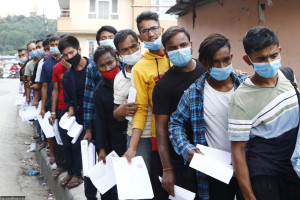Money
Victims of gas explosions to receive compensation
Bottlers of liquefied petroleum gas (LPG) have announced that consumers will be paid compensation for accidental death or injury due to gas cylinder explosion.
Bottlers of liquefied petroleum gas (LPG) have announced that consumers will be paid compensation for accidental death or injury due to gas cylinder explosion.
The Nepal LP Gas Industry Association on Monday told the parliamentary Industry, Commerce and Consumer Welfare Protection Committee that it would provide insurance coverage of up to Rs1 million to an individual amid public outcry following a series of gas cylinder explosions resulting in death and injury.
“All the gas bottlers have given their consent to implementing the insurance scheme,” Kush Kumar Malli, vice-president of the association, told lawmakers. Currently, a few gas bottlers provide third-party insurance coverage amounting to Rs500,000.
The government has not fixed a mandatory insurance amount to cover accidental death or injury caused by an LPG cylinder explosion, said Mukunda Ghimire, spokesperson for Nepal Oil Corporation (NOC). “Although the law has directed gas bottlers to insure their customers, it is silent on the coverage amount,” he added.
Calls for compensation and insurance coverage intensified following the explosion of a gas cylinder of HP Gas in Haugal, Lalitpur on May 20 that killed three people.
The deaths and resulting public outrage prompted the government to bar HP Gas from importing cooking gas. The ban was withdrawn after the company agreed to pay Rs4 million in compensation to the families of the deceased.
In another incident in Samajhdari, Kalimati, a fire broke out due to a leakage in a cylinder of Sugam Gas, resulting in the death of a child. Both the incidents have been blamed on poor quality cylinders supplied by gas bottlers.
A large number of the 6.5 million cylinders in circulation nationwide have not undergone hydrostatic testing and valve maintenance, according to the Nepal Bureau of Standards and Metrology (NBSM).
Bishwa Babu Pudasaini, director general of the NBSM, said many bottlers had not conducted tests despite having the necessary equipment. “We have been keeping an eye on gas bottlers not abiding by the law,” he said.
NOC Managing Director Gopal Bahadur Khadka said they were considering not issuing purchase delivery orders to bottlers that are reluctant to install modern safety systems for refilling and checking the quality of cylinders.
According to him, NOC will also be directing bottlers to increase their gas storage capacity. “Bottling plants should have a capacity to store 500 tonnes of LPG,” said Khadka. The capacities of the gas companies now range from 30 to 300 tonnes, he added.
Consumer rights activists have blamed the government for the growing incidents of gas cylinder explosions. Prem Lal Maharjan, president of the National Consumer Forum, said that weak government monitoring had jeopardised the safety of consumers.
Meanwhile, NOC said that it was planning to collaborate with Salt Trading Corporation to install a gas bottling plant in Hetauda. NOC Managing Director Khadka said the scheme was aimed at preventing possible supply disruptions due to the vagaries of private gas companies.




 22.46°C Kathmandu
22.46°C Kathmandu














